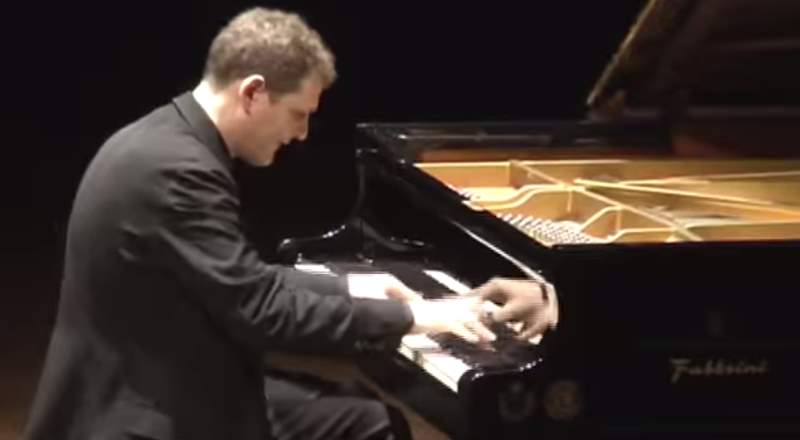Italian pianist and composer Paolo Marzocchi plays Franz Liszt’s Hungarian Rhapsody No. 2, S.244/2, the second in a set of 19 Hungarian Rhapsodies by the Hungarian composer, and is by far the most famous of the set. In the second video, the orchestral version is performed by the Berliner Philharmoniker (the Berlin Philharmonic Orchestra), conducted by Herbert von Karajan.
Franz Liszt’s Hungarian Rhapsody No. 2
The piece consists of two distinct sections.
The first is the lassan, with its brief but dramatic introduction. Although beginning on the C-sharp major triad, C-sharp minor is soon established as the home key. From this point on, the composer modulates freely, particularly to the tonic major and the relative major. The mood of the lassan is generally dark and melancholic, although it contains some playful and capricious moments.
The second section is the friska. It opens quietly in the key of F-sharp minor, but on its dominant chord, C-sharp major, recalling a theme from the lassan. The alternating dominant and tonic harmonies quickly increase in volume, the tempo gaining momentum as Friska’s main theme (in F-sharp major) is approached. At this point, the Friska begins its journey of ever-increasing energy and pianistic bravura, still underpinned by alternating tonic and dominant harmonies.
Modulations are limited almost exclusively to the dominant (C-sharp major) and the lowered mediant (A major). Before the final whirlwind of sound, a moment of calm prevails in the key of F-sharp minor, recalling another of the lassan’s themes, and is followed by the instruction, Cadenza ad lib. Finally, in the key of F-sharp major, there is a crescendo of prestissimo octaves, which ascend and then descend to cover almost the entire range of the keyboard bringing the Rhapsody to a conclusion.
Paolo Marzocchi
Paolo Marzocchi is a pianist and composer. He was born in Pesaro in 1971.
During the last fifteen years, he composed and played music for different contexts, from “pure” composition to theatre, cinema, and experimentation with other languages.
He worked on a commission for the realization of works for both piano and orchestra.
He worked for several orchestras and associations and among them Teatro dell’Opera di Roma, Arena di Verona Foundation, Milan Pomeriggi Musicali Orchestra, Orchestra Filarmonica Marchigiana, Human Rights Orchestra, Jesi Pergolesi Spontini Festival, Milan Musicamorfosi Association, Pesaro Concert Board, Grosseto Symphonic Orchestra, Ancona Amici della Musica Association, 30th International Piano Competition “Città di Senigallia”, Teramo “Benedetto Marcello” Orchestra.

Paolo Marzocchi has been a member of the Musicians for Human Rights Movement since 2009. It was founded by Alessio Allegrini, with whom Marzocchi is working on several projects concerning musical education and awareness raising of social issues and problems.
Both as a composer and as a pianist, Marzocchi performed in prestigious houses and places such as Accademia Chigiana in Siena, KKL Luzern Konzertsaal in Lucerne, Milan Auditorium, Venice Biennale, Teatro dal Verme in Milan, Teatro delle Muse in Ancona, BKA Theatre in Berlin, Kawasaki Festival and Suntory Hall in Tokyo, Aram Katchaturian Concert Hall in Yerevan, in Munich, Beijing. Some of his compositions were broadcast by several Italian and European radios.
One of his latest works is the absolute first performance of the first scene of the opera “La Balena”. The libretto by Joseph Denize is freely inspired by “Moby Dick” by Hermann Melville (2010, Pontlevoy, France). The music by Marzocchi is published by Sonzogno and Rugginenti.
In 2007-2008 Marzocchi was an “artist in residence” at “Villa Waldberta” in Feldafing, a town near Munich.
During his concerts, besides his compositions, he usually plays works from the traditional repertoire and piano rarities.
He edited the volume Julius Reubke, Opere per pianoforte (Julius Reubke: Piano Works) published by Rugginenti. The volume contains the complete piano works by Liszt’s pupils collected in a modern critical edition. He recorded the complete works for piano and organ by Reubke with the organist Luca Scandali for the German label CPO.
He worked with artists such as the conductor Michele Mariotti, Corrado Rovaris, Alessio Allegrini, Leonardo Gasparini, the writer Guido Barbieri, the director Henning Brockaus, the poet Gianni D’Elia, the director Michal Kosakowsky, the writer Joseph Denize, the video artists Stefano Franceschetti and Cristiano Carloni and the director Chiara Sambuchi.
Marzocchi also composed the music for the project “Just Like The Movies” by Michal Kosakowski. Thanks to this project, he won several prizes such as a prize at the Milano Film Festival, the prize for the best soundtrack at the 16Corto Festival in Forlì, and the prize for the best experimental film at the Santiago Film Festival in Chile. The project was broadcast by ARTE channel and the DVD was released in France with the title “Underground Zero” (Repérages).
The music was performed live in Munich, Beijing, Rio de Janeiro, Berlin, and Italy. Other soundtracks were composed by Marzocchi for “The Baghdad Railway” (Lavafilm production – ARTE – ARD – History Channel) directed by Roland May (2006); “The Shadow Within” directed by Silvana Zancolò (Pixel DNA – Weedram Production Inc., 2007). Marzocchi recently composed the soundtrack for the documentary film “The Wrong Planet” directed by Chiara Sambuchi (ZDF – Lavafilm production, May 2008) and for the experimental documentary “Heart of It” directed by Michal Kosakowski (October 2008).
Paolo Marzocchi is a professor at the University of Macerata and at the Academies of Art of Urbino and Macerata.
Sources
- Hungarian Rhapsody No. 2 on Wikipedia
- Paolo Marzocchi’s official website
